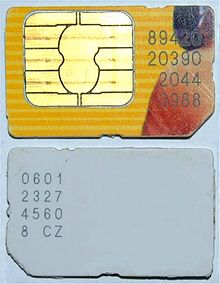Main article: Mobile phone features
See also: Smartphone
All mobile phones have a number of features in common, but manufacturers also try to differentiate their own products by implementing additional functions to make them more attractive to consumers. This has led to great innovation in mobile phone development over the past 20 years.
- A battery, providing the power source for the phone functions.
- An input mechanism to allow the user to interact with the phone. The most common input mechanism is a keypad, but touch screens are also found in some high-end smartphones.
- Basic mobile phone services to allow users to make calls and send text messages.
- All GSM phones use a SIM card to allow an account to be swapped among devices. Some CDMA devices also have a similar card called a R-UIM.
- Individual GSM, WCDMA, iDEN and some satellite phone devices are uniquely identified by an International Mobile Equipment Identity (IMEI) number.
Low-end mobile phones are often referred to as feature phones, and offer basic telephony. Handsets with more advanced computing ability through the use of native software applications became known as smartphones.
Several phone series have been introduced to address a given market segment, such as the RIM BlackBerry focusing on enterprise/corporate customer email needs; the SonyEricsson Walkman series of musicphones and Cybershot series of cameraphones; the Nokia Nseries of multimedia phones, the Palm Pre the HTC Dream and the Apple iPhone.
Text messaging
Main article: SMS
The most commonly used data application on mobile phones is SMS text messaging. The first SMS text message was sent from a computer to a mobile phone in 1992 in the UK, while the first person-to-person SMS from phone to phone was sent in Finland in 1993.
The first mobile news service, delivered via SMS, was launched in Finland in 2000. Mobile news services are expanding with many organizations providing "on-demand" news services by SMS. Some also provide "instant" news pushed out by SMS.
SIM card
Main articles: Subscriber Identity Module and Removable User Identity Module
GSM feature phones require a small microchip called a Subscriber Identity Module or SIM Card, to function. The SIM card is approximately the size of a small postage stamp and is usually placed underneath the battery in the rear of the unit. The SIM securely stores the service-subscriber key (IMSI) used to identify a subscriber on mobile telephony devices (such as mobile phones and computers). The SIM card allows users to change phones by simply removing the SIM card from one mobile phone and inserting it into another mobile phone or broadband telephony device.
The first SIM card was made in 1991 by Munich smart card maker Giesecke & Devrient for the Finnish wireless network operator Radiolinja. Giesecke & Devrient sold the first 300 SIM cards to Elisa (ex. Radiolinja).
Multi-card hybrid phones
A hybrid mobile phone can take more than one SIM card, even of different types. The SIM and RUIM cards can be mixed together, and some phones also support three or four SIMs.
From 2010 onwards they became popular in India and Indonesia and other emerging markets, attributed to the desire to obtain the lowest on-net calling rate. In Q3 2011, Nokia shipped 18 million of its low cost dual SIM phone range in an attempt to make up lost ground in the higher end smartphone market.
Kosher phones
There are many religious restrictions on entertainment and other issues which standard mobile telephones do not meet. Phones and networks are available without access to the Internet or text messaging and without cameras, used on networks with restricted functionality, with rabbinical approval for use in Israel and elsewhere by observant Orthodox Jews. These devices are known as kosher phones. Some are even approved for use on the sabbath, when use of any electrical device is very restricted, by essential workers with important needs such as health, security, public services, water and electricity.
While the phones are intended to prevent immodesty and to protect children, British vendors report good sales to adults who prefer the simplicity, and a majority of online sales to non-Jewish customers around the world, to places like Saudi Arabia. A British rabbi reports concerns among Muslims and other non-Jews that encourage them to follow the lead of kosher phones.


No comments:
Post a Comment